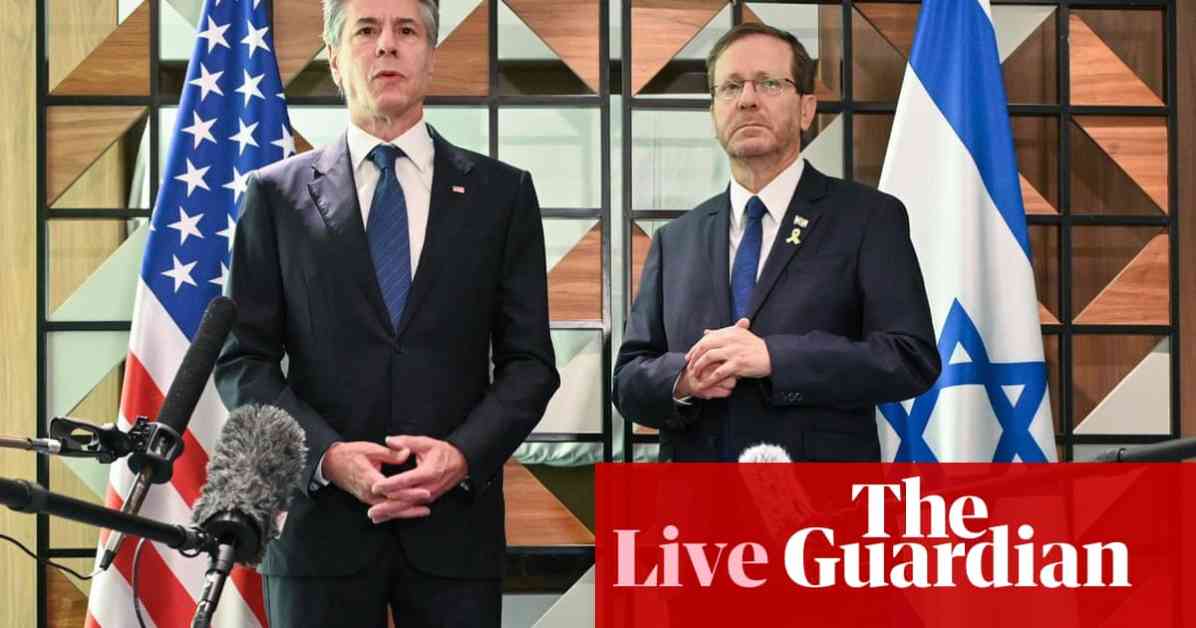US Secretary of State Antony Blinken is in Tel Aviv to push for a ceasefire agreement in the ongoing crisis in the Middle East, particularly focusing on the release of hostages held in Gaza. Blinken emphasized the urgency of the situation, stating that this may be the best and potentially last opportunity to secure the safe return of the hostages and establish a lasting ceasefire. He noted that President Joe Biden had tasked him with finalizing the agreement and ensuring that all parties involved commit to the process.
During his meeting with Israeli President Isaac Herzog, Blinken stressed the importance of swift action to bring the hostages home and prevent any further escalation of the conflict. He highlighted the need for all parties to refrain from actions that could derail the negotiation process or escalate tensions in the region. Blinken’s visit to Tel Aviv marks his ninth trip to the Middle East since the conflict began with Hamas’s attack on Israel in October.
The situation in Israel remains tense, with threats of retaliation from Iran and Lebanon’s Hezbollah following the recent killings of two militant leaders. Hezbollah claimed responsibility for attacks on Israeli troops and military positions, including drone strikes and assaults near the Lebanese border. The group has been engaged in regular cross-border exchanges with the Israeli army in support of Hamas since the conflict erupted.
In response to escalating violence, Blinken urged all parties to prioritize the release of hostages and the establishment of a ceasefire to prevent further loss of life and destruction. He emphasized the need for a peaceful resolution to the conflict and urged leaders to work towards a lasting peace that ensures the safety and security of all individuals in the region.
As the negotiations for a ceasefire and the release of hostages continue, it is crucial for all parties involved to prioritize humanitarian objectives and work towards a peaceful resolution to the crisis. The international community, led by the United States, is closely monitoring the situation and working towards a peaceful resolution that benefits all parties involved.
Challenges and Sticking Points in Negotiations
Despite efforts to reach a ceasefire agreement and secure the release of hostages, there are several challenges and sticking points that continue to impede progress in the negotiations. Both Hamas and Israel have been working towards a three-phase process that involves the release of hostages, the exchange of prisoners, and the establishment of a lasting ceasefire. However, disagreements over key issues such as the timeline for the release of hostages and the presence of Israeli military along the Gaza-Egypt border have hindered progress in the talks.
President Joe Biden has expressed support for the proposed agreement, and the UN Security Council has also approved it. However, both Hamas and Israel have raised concerns and made new demands that have complicated the negotiation process. Hamas is seeking assurances that Israel will not resume hostilities after the release of hostages, while Israel is adamant about maintaining a military presence along the border to prevent rearmament by Hamas and other militias.
The leadership on both sides, including Israeli Prime Minister Benjamin Netanyahu and Hamas leader Yahya Sinwar, play crucial roles in deciding the fate of the negotiations. Netanyahu faces pressure from the families of hostages and the Israeli public to reach a deal, but he must also contend with opposition from far-right leaders in his coalition. Sinwar, on the other hand, remains entrenched in Gaza and has maintained a hardline stance throughout the talks.
As the negotiations continue, it is essential for all parties to engage in good faith discussions and prioritize the humanitarian objectives at hand. The release of hostages and the establishment of a ceasefire are critical steps towards ending the conflict and ensuring the safety and security of all individuals in the region.
Recent Developments and International Response
Amid ongoing violence and escalating tensions, the international community has called for a ceasefire and a peaceful resolution to the crisis in the Middle East. The United States, in particular, has been actively involved in mediating the negotiations and pushing for a swift resolution to the conflict. Secretary of State Antony Blinken’s visit to Tel Aviv underscores the urgency of the situation and the need for all parties to prioritize peace and stability in the region.
Recent attacks and retaliatory actions by Hezbollah and Israel have further heightened tensions and raised concerns about the possibility of a wider regional conflict. The targeting of civilian populations and the use of drones and rockets in populated areas have resulted in civilian casualties and raised alarms about the humanitarian impact of the conflict.
As the negotiations for a ceasefire and the release of hostages continue, it is imperative for all parties to adhere to international humanitarian law and protect the rights and safety of civilians in the region. The international community must continue to support efforts towards a peaceful resolution and work towards a lasting ceasefire that addresses the root causes of the conflict.
In conclusion, the crisis in the Middle East requires a concerted effort from all parties involved to prioritize peace, stability, and the protection of civilian populations. The release of hostages and the establishment of a ceasefire are critical steps towards ending the violence and creating a path towards lasting peace and security in the region. The international community must continue to support diplomatic efforts and work towards a peaceful resolution that benefits all individuals in the region.












